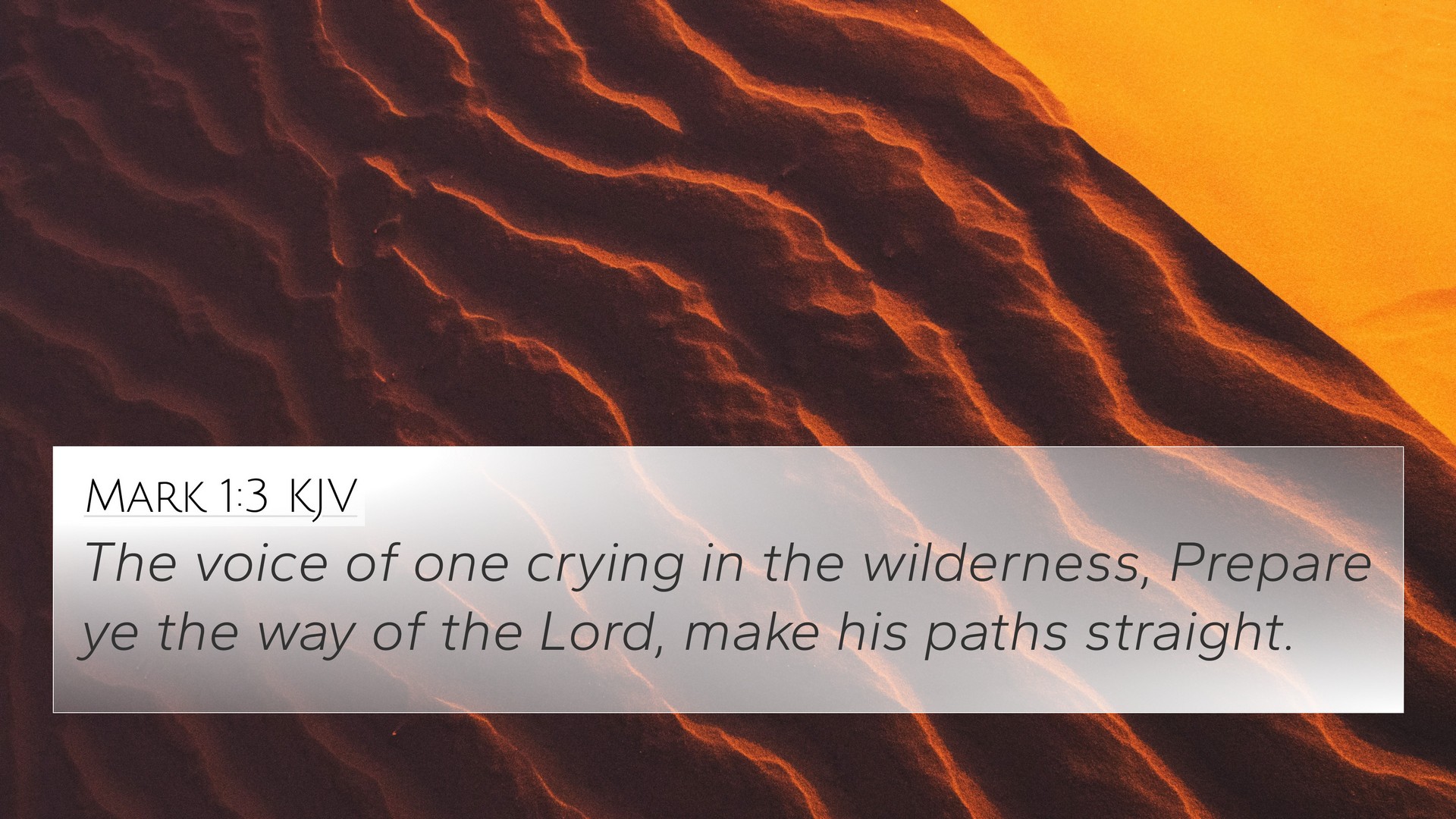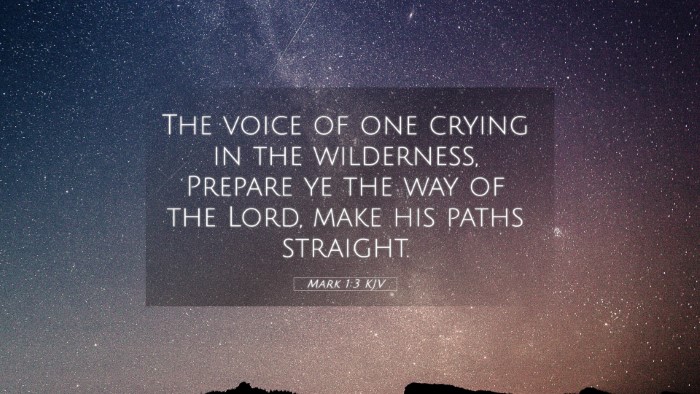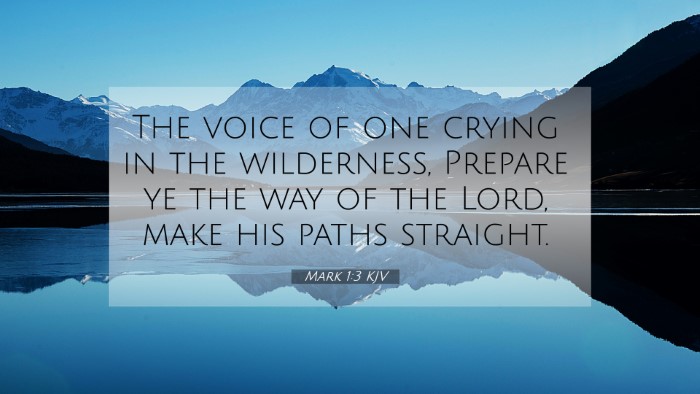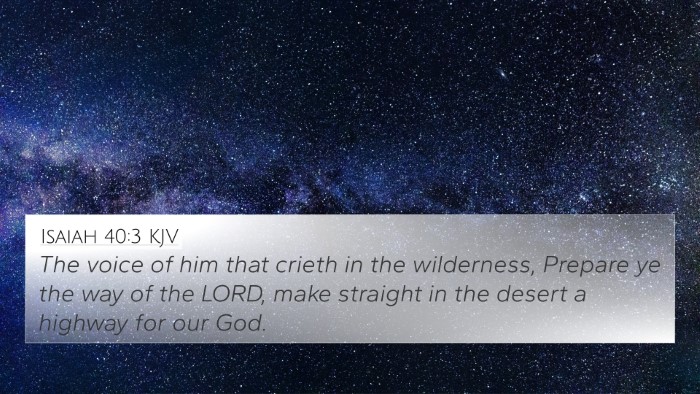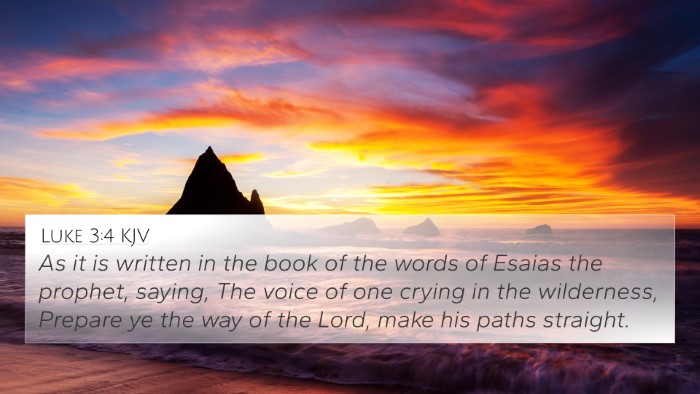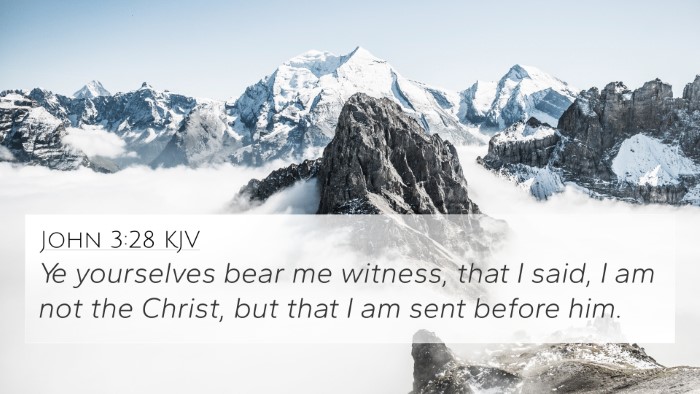Understanding Mark 1:3
Mark 1:3 states: "The voice of one crying in the wilderness: Prepare the way of the Lord; make His paths straight." This verse plays a significant role in the narrative of the New Testament as it introduces the ministry of John the Baptist and sets the stage for the coming of Jesus Christ. Below, we will explore the scriptural connections and interpretations from various public domain commentaries.
Exegesis and Context
This verse draws on prophetic imagery and fulfills the prophecy found in Isaiah 40:3, demonstrating the continuity of the Old and New Testaments. The voice mentioned speaks of a messenger preparing the way, which is critical in understanding both the urgency and purpose of John's ministry. According to Matthew Henry, this voice represents the call of God to a wayward people to return to Him, implying repentance and readiness for salvation.
Albert Barnes highlights that the wilderness symbolizes a place of desolation and the need for spiritual renewal. The call to prepare the way demonstrates God's initiation of reconciliation with humanity through the message of repentance. This aligns with the overarching theme of the gospel, focusing on transformation and redemption.
Adam Clarke adds that the phrase "make His paths straight" indicates the necessity of removing obstacles that hinder the spiritual journey, suggesting that sinners must clear their hearts of sin to receive salvation fully. This poetic imagery enhances the urgency for personal preparation that each individual must undertake.
Cross-References
This verse has numerous cross-references throughout the Scriptures that support its themes and prophecies:
- Isaiah 40:3 - "A voice cries: In the wilderness prepare the way of the Lord; make straight in the desert a highway for our God."
- Malachi 3:1 - "Behold, I send my messenger, and he will prepare the way before me..."
- Matthew 3:3 - "For this is he who was spoken of by the prophet Isaiah when he said, 'The voice of one crying in the wilderness: Prepare the way of the Lord...'"
- Luke 1:76 - "And you, child, will be called the prophet of the Most High; for you will go before the Lord to prepare his ways."
- John 1:23 - "He said, 'I am the voice of one crying out in the wilderness, Make straight the way of the Lord...'"
- Isaiah 57:14 - "And it shall be said, 'Build up, build up, prepare the way, remove every obstruction from my people's way.'"
- Acts 13:24 - "Before his coming, John had proclaimed a baptism of repentance to all the people of Israel."
Thematic Connections
The themes present in Mark 1:3 resonate with several significant biblical concepts, including repentance, preparation, and divine revelation. The connection between John’s ministry and the call for repentance anticipates the message of Jesus, linking both figures and their purposes in the salvation narrative. John's role as a preparatory figure is consistent with the soteriological aims of the Gospel. Below are further insights into these themes:
Repentance and Preparation
John's call to repentance serves as a precursor to Jesus's teachings. This theme of preparation is further echoed in various writings throughout both the Old and New Testaments, emphasizing the necessity of spiritual readiness among the followers of God.
Divine Revelation
The proclamation of the coming Lord signifies God's ongoing interaction and revelation to humanity. The anticipation of Jesus as the Messiah builds upon Old Testament prophecies and reflections, showcasing an inter-Biblical dialogue that enriches the reader's understanding.
Concluding Insights
Mark 1:3 exemplifies the rich tapestry of biblical themes woven throughout Sacred Scripture. By utilizing tools for Bible cross-referencing, one can uncover deeper meanings and connections between verses, enriching personal study and reflection.
As seen through the commentaries and cross-references, the importance of making clear paths for God is not merely a historical or prophetic statement but an ongoing call for all believers to prepare their hearts and lives for the transformative work of Christ.
Further Studies and Resources
For those interested in exploring these connections further, consulting a Bible concordance or a Bible cross-reference guide can enhance one's understanding. Utilizing cross-referencing methods can significantly aid in identifying relationships between different parts of Scripture, supporting deeper theological study and personal application.
In conclusion, Mark 1:3 stands as a pivotal verse that beckons readers to recognize the significance of preparation in the journey of faith, encouraging an attentive heart toward the transformative call of Jesus.
